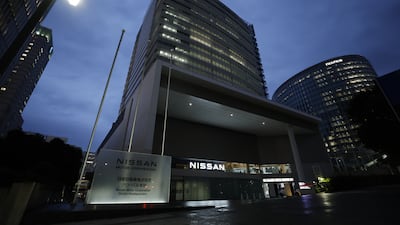Nissan Motor has named Ivan Espinosa its new chief executive as part of a major shake-up to its top brass, in a bid to realign the troubled Japanese car maker after its merger talks with Honda Motor failed.
Mr Espinosa, who is from Mexico and is the Yokohama-based company's current chief planning officer, will replace the embattled Makoto Uchida, who will be stepping down on March 31 along with other senior executives, Nissan said in a statement on Tuesday.
Mr Uchida has faced pressure to step down amid Nissan's worsening performance, exacerbated by the failure of its talks with Honda, which ended last month.
The other executives departing are Asako Hoshino, chief brand and customer officer, and Hideaki Watanabe, chief strategy and corporate affairs officer.
Nissan also announced changes, which include expanding roles and replacing personnel, to its executive committee, which will report to Mr Espinosa from April 1.
The moves are aimed at "introducing a significantly renewed leadership line-up to achieve the company's short and mid-term objectives while positioning it for long-term growth", Nissan said.
"Effective [from] April 1, the board of directors has approved titles and areas of responsibility for the representative executive officer and executive officers." Mr Espinosa will also assume the roles of representative executive officer and president.
The shake-up is the latest twist at Nissan, which is trying to fend off competition in an increasingly tough automotive industry, while at the same time keep in step with advancements in electric vehicle technology.
It also had to deal with the fallout from the financial misconduct case of former boss Carlos Ghosn, who remains a fugitive after his dramatic escape from Japan five years ago.
In December, Nissan and Tokyo-based Honda signed an initial pact to begin talks to explore a potential merger through the establishment of a joint holding company, deemed a historic move in the industry that would have created the world's third-biggest auto group after Toyota and Germany's Volkswagen.
That would have helped both companies catch up in the EV race, in addition to taking on the onslaught of vehicles from Chinese manufacturers. The two companies were aiming for combined sales revenue exceeding 30 trillion yen ($191 billion) and operating profit of more than 3 trillion yen, they said at the time.
Mitsubishi Motors, of which 24.5 per cent is owned by Nissan, also signed the initial agreement to participate in the potential merger.
However, talks became bogged down in disagreements on how the joint holding company would be structured. In particular, discussions began to unravel after Honda proposed to make Nissan its subsidiary instead, Japanese media had reported. The companies ended negotiations on February 13.
COMPANY%20PROFILE
%3Cp%3E%3Cstrong%3ECompany%20name%3A%3C%2Fstrong%3E%20Klipit%3C%2Fp%3E%0A%3Cp%3E%3Cstrong%3EStarted%3A%3C%2Fstrong%3E%202022%3C%2Fp%3E%0A%3Cp%3E%3Cstrong%3EFounders%3A%3C%2Fstrong%3E%20Venkat%20Reddy%2C%20Mohammed%20Al%20Bulooki%2C%20Bilal%20Merchant%2C%20Asif%20Ahmed%2C%20Ovais%20Merchant%3C%2Fp%3E%0A%3Cp%3E%3Cstrong%3EBased%3A%3C%2Fstrong%3E%20Dubai%2C%20UAE%3C%2Fp%3E%0A%3Cp%3E%3Cstrong%3EIndustry%3A%3C%2Fstrong%3E%20Digital%20receipts%2C%20finance%2C%20blockchain%3C%2Fp%3E%0A%3Cp%3E%3Cstrong%3EFunding%3A%3C%2Fstrong%3E%20%244%20million%3C%2Fp%3E%0A%3Cp%3E%3Cstrong%3EInvestors%3A%3C%2Fstrong%3E%20Privately%2Fself-funded%3C%2Fp%3E%0A
Company%20Profile
%3Cp%3E%3Cstrong%3ECompany%20name%3A%3C%2Fstrong%3E%20Hoopla%3Cbr%3E%3Cstrong%3EDate%20started%3A%20%3C%2Fstrong%3EMarch%202023%3Cbr%3E%3Cstrong%3EFounder%3A%3C%2Fstrong%3E%20Jacqueline%20Perrottet%3Cbr%3E%3Cstrong%3EBased%3A%3C%2Fstrong%3E%20Dubai%3Cbr%3E%3Cstrong%3ENumber%20of%20staff%3A%3C%2Fstrong%3E%2010%3Cbr%3E%3Cstrong%3EInvestment%20stage%3A%20%3C%2Fstrong%3EPre-seed%3Cbr%3E%3Cstrong%3EInvestment%20required%3A%3C%2Fstrong%3E%20%24500%2C000%3C%2Fp%3E%0A
Lexus LX700h specs
Engine: 3.4-litre twin-turbo V6 plus supplementary electric motor
Power: 464hp at 5,200rpm
Torque: 790Nm from 2,000-3,600rpm
Transmission: 10-speed auto
Fuel consumption: 11.7L/100km
On sale: Now
Price: From Dh590,000
How to register as a donor
1) Organ donors can register on the Hayat app, run by the Ministry of Health and Prevention
2) There are about 11,000 patients in the country in need of organ transplants
3) People must be over 21. Emiratis and residents can register.
4) The campaign uses the hashtag #donate_hope
The specs
Engine: 3.9-litre twin-turbo V8
Transmission: seven-speed
Power: 620bhp
Torque: 760Nm
Price: Dh898,000
On sale: now
RIDE%20ON
%3Cp%3EDirector%3A%20Larry%20Yang%3C%2Fp%3E%0A%3Cp%3EStars%3A%20Jackie%20Chan%2C%20Liu%20Haocun%2C%20Kevin%20Guo%3C%2Fp%3E%0A%3Cp%3ERating%3A%202%2F5%3C%2Fp%3E%0A
Score
Third Test, Day 1
New Zealand 229-7 (90 ov)
Pakistan
New Zealand won the toss and elected to bat
POWERWASH%20SIMULATOR
%3Cp%3E%3Cstrong%3EDeveloper%3A%3C%2Fstrong%3E%20FuturLab%3Cbr%3E%3Cstrong%3EPublisher%3A%20%3C%2Fstrong%3ESquare%20Enix%20Collective%3Cbr%3E%3Cstrong%3EConsole%3A%20%3C%2Fstrong%3ENintendo%20Switch%2C%3Cstrong%3E%20%3C%2Fstrong%3EPlayStation%204%20%26amp%3B%205%2C%20Xbox%20Series%20X%2FS%20and%20PC%3Cbr%3E%3Cstrong%3ERating%3A%3C%2Fstrong%3E%204%2F5%3C%2Fp%3E%0A
Why%20all%20the%20lefties%3F
%3Cp%3ESix%20of%20the%20eight%20fast%20bowlers%20used%20in%20the%20ILT20%20match%20between%20Desert%20Vipers%20and%20MI%20Emirates%20were%20left-handed.%20So%2075%20per%20cent%20of%20those%20involved.%0D%3Cbr%3EAnd%20that%20despite%20the%20fact%2010-12%20per%20cent%20of%20the%20world%E2%80%99s%20population%20is%20said%20to%20be%20left-handed.%0D%3Cbr%3EIt%20is%20an%20extension%20of%20a%20trend%20which%20has%20seen%20left-arm%20pacers%20become%20highly%20valued%20%E2%80%93%20and%20over-represented%2C%20relative%20to%20other%20formats%20%E2%80%93%20in%20T20%20cricket.%0D%3Cbr%3EIt%20is%20all%20to%20do%20with%20the%20fact%20most%20batters%20are%20naturally%20attuned%20to%20the%20angles%20created%20by%20right-arm%20bowlers%2C%20given%20that%20is%20generally%20what%20they%20grow%20up%20facing%20more%20of.%0D%3Cbr%3EIn%20their%20book%2C%20%3Cem%3EHitting%20Against%20the%20Spin%3C%2Fem%3E%2C%20cricket%20data%20analysts%20Nathan%20Leamon%20and%20Ben%20Jones%20suggest%20the%20advantage%20for%20a%20left-arm%20pace%20bowler%20in%20T20%20is%20amplified%20because%20of%20the%20obligation%20on%20the%20batter%20to%20attack.%0D%3Cbr%3E%E2%80%9CThe%20more%20attacking%20the%20batsman%2C%20the%20more%20reliant%20they%20are%20on%20anticipation%2C%E2%80%9D%20they%20write.%0D%3Cbr%3E%E2%80%9CThis%20effectively%20increases%20the%20time%20pressure%20on%20the%20batsman%2C%20so%20increases%20the%20reliance%20on%20anticipation%2C%20and%20therefore%20increases%20the%20left-arm%20bowler%E2%80%99s%20advantage.%E2%80%9D%0D%3Cbr%3E%3C%2Fp%3E%0A
ILT20%20UAE%20stars
%3Cp%3E%3Cstrong%3ELEADING%20RUN%20SCORERS%3C%2Fstrong%3E%3Cbr%3E1%20Nicholas%20Pooran%2C%20261%3Cbr%3E%3Cstrong%3E2%20Muhammad%20Waseem%20(UAE)%2C%20248%3C%2Fstrong%3E%3Cbr%3E3%20Chris%20Lynn%2C%20244%3Cbr%3E4%20Johnson%20Charles%2C%20232%3Cbr%3E5%20Kusal%20Perera%2C%20230%3Cbr%3E%3Cbr%3E%3Cstrong%3EBEST%20BOWLING%20AVERAGE%3C%2Fstrong%3E%3Cbr%3E(minimum%2010%20overs%20bowled)%3Cbr%3E%3Cstrong%3E1%20Zuhaib%20Zubair%20(UAE)%2C%209%20wickets%20at%2012.44%3Cbr%3E2%20Mohammed%20Rohid%20(UAE)%2C%207%20at%2013.00%3C%2Fstrong%3E%3Cbr%3E3%20Fazalhaq%20Farooqi%2C%2017%20at%2013.05%3Cbr%3E4%20Waqar%20Salamkheil%2C%2010%20at%2014.08%3Cbr%3E%3Cstrong%3E5%20Aayan%20Khan%20(UAE)%2C%204%20at%2015.50%3C%2Fstrong%3E%3Cbr%3E6%20Wanindu%20Hasaranga%2C%2012%20at%2016.25%3Cbr%3E%3Cstrong%3E7%20Mohammed%20Jawadullah%20(UAE)%2C%2010%20at%2017.00%3C%2Fstrong%3E%3C%2Fp%3E%0A
Fixtures
%3Cp%3E%3Cstrong%3EWednesday%2C%20April%203%3C%2Fstrong%3E%3C%2Fp%3E%0A%3Cp%3EArsenal%20v%20Luton%20Town%2C%2010.30pm%20(UAE)%3C%2Fp%3E%0A%3Cp%3EManchester%20City%20v%20Aston%20Villa%2C%2011.15pm%20(UAE)%3C%2Fp%3E%0A%3Cp%3E%3Cstrong%3EThursday%2C%20April%204%3C%2Fstrong%3E%3C%2Fp%3E%0A%3Cp%3ELiverpool%20v%20Sheffield%20United%2C%2010.30pm%20(UAE)%3C%2Fp%3E%0A
SPECS
%3Cp%3E%3Cstrong%3EEngine%3A%20%3C%2Fstrong%3E2-litre%204-cylinder%20petrol%20(V%20Class)%3B%20electric%20motor%20with%2060kW%20or%2090kW%20powerpack%20(EQV)%0D%3Cbr%3E%3Cstrong%3EPower%3A%3C%2Fstrong%3E%20233hp%20(V%20Class%2C%20best%20option)%3B%20204hp%20(EQV%2C%20best%20option)%0D%3Cbr%3E%3Cstrong%3ETorque%3A%3C%2Fstrong%3E%20350Nm%20(V%20Class%2C%20best%20option)%3B%20TBA%20(EQV)%0D%3Cbr%3E%3Cstrong%3EOn%20sale%3A%20%3C%2Fstrong%3EMid-2024%0D%3Cbr%3E%3Cstrong%3EPrice%3A%20%3C%2Fstrong%3ETBA%0D%3C%2Fp%3E%0A
%3Cp%3E%3Cstrong%3EDirector%3A%3C%2Fstrong%3E%20Nag%20Ashwin%3C%2Fp%3E%0A%3Cp%3E%3Cstrong%3EStarring%3A%20%3C%2Fstrong%3EPrabhas%2C%20Saswata%20Chatterjee%2C%20Deepika%20Padukone%2C%20Amitabh%20Bachchan%2C%20Shobhana%3C%2Fp%3E%0A%3Cp%3E%3Cstrong%3ERating%3A%20%3C%2Fstrong%3E%E2%98%85%E2%98%85%E2%98%85%E2%98%85%3C%2Fp%3E%0A
Joker: Folie a Deux
Starring: Joaquin Phoenix, Lady Gaga, Brendan Gleeson
Director: Todd Phillips
Rating: 2/5
Jetour T1 specs
Engine: 2-litre turbocharged
Power: 254hp
Torque: 390Nm
Price: From Dh126,000
Available: Now
COMPANY PROFILE
● Company: Bidzi
● Started: 2024
● Founders: Akshay Dosaj and Asif Rashid
● Based: Dubai, UAE
● Industry: M&A
● Funding size: Bootstrapped
● No of employees: Nine
Citadel: Honey Bunny first episode
Directors: Raj & DK
Stars: Varun Dhawan, Samantha Ruth Prabhu, Kashvi Majmundar, Kay Kay Menon
Rating: 4/5
Farasan Boat: 128km Away from Anchorage
Director: Mowaffaq Alobaid
Stars: Abdulaziz Almadhi, Mohammed Al Akkasi, Ali Al Suhaibani
Rating: 4/5
Name: Brendalle Belaza
From: Crossing Rubber, Philippines
Arrived in the UAE: 2007
Favourite place in Abu Dhabi: NYUAD campus
Favourite photography style: Street photography
Favourite book: Harry Potter



